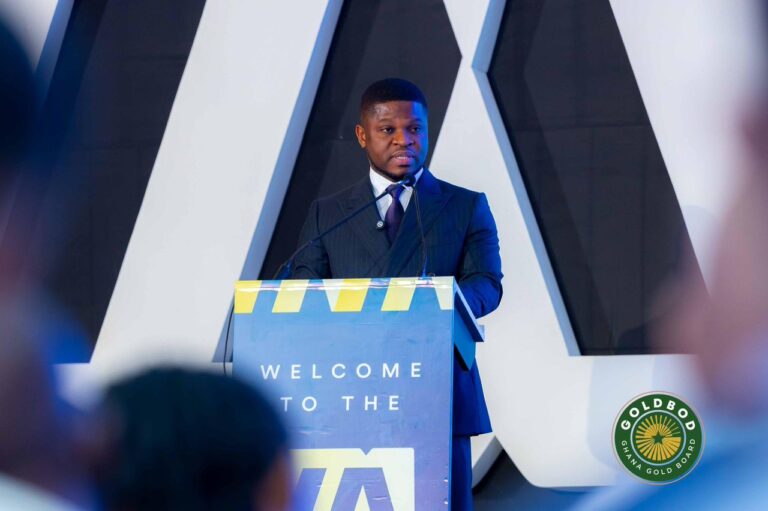Ghana cannot maximize the full value of its gold resources if the country continues to export doré which is raw, rough and unrefined gold instead of exporting ‘bullion’ which is refined gold, the Ghana Gold Board (GoldBod) has cautioned and said the Board is committed to resolving this challenge by building a wholly State-owned refinery.
“As part of the reset agenda of the Mahama-led administration, the GoldBod in conjunction with the Bank of Ghana, is partnering local refineries such as the Gold Coast Refinery to begin the local refining of gold purchased and exported by the GoldBod”, the Board’s Chief Executive Sammy Gyamfi has announced in Accra.
Sammy Gyamfi described the current situation as a “national shame” and commended the Chamber of Mines for expressing their willingness to work with the GoldBod to ensure the local refining of gold produced by large-scale mining firms in the country.
He said the GoldBod has already secured a parcel of land near the Kotoka International Airport for building of a wholly state-owned and international-standard gold refinery to further advance the local refining of gold, transitioning Ghana from the export of doré to bullion.
The GoldBod Chief Executive was speaking at the Mining and Minerals Convention in Accra on Tuesday, September 9, 2025.
He said the GoldBod would continue to drive innovation, and in addition to the state-owned gold refinery there would also be an ultra-modern ISO certified Assay Laboratory with the aim of changing Ghana’s assay regime from XRF and water density to the golden standard of assay – fire assay, for all gold produced in and/or exported from Ghana.
“But this dream will elude us without the critical partnership of financial institutions for value-adding investments, particularly in area of refining, minting and the fabrication of minerals into jewelry, coins, tablets, and other forms of castings for domestic consumption and exports.
“We must shift from raw exports to in-continent beneficiation; move from rent-seeking middlemen to decentralized, tech-enabled trade models, and change from youth as laborers to youth as innovators, financiers, and owners. This is no plea for aid. It’s a declaration: Africa is ready to transform”, Sammy Gyamfi noted.
Illegal Mining
Sammy Gyamfi said because GoldBod recognizes the importance of responsible mining and sourcing to the long-term sustainability and viability of Ghana’s mining sector, the Board has demonstrated commitment to government’s avowed flight against the illegal mining menace.
“To this end, the GoldBod will next week, donate five (5) Toyota Hilux pickups and an amount of GHS5 million to support the work of the National Anti-Illegal Mining Operations Secretariat (NAIMOS).
“Also, in line with the instructions of H.E. President John Dramani Mahama, and in furtherance of our ecological restoration policy, the GoldBod has made significant financial allocation to support the reclamation of 1000 hectares of devastated forest reserves, starting from November this year.
“Under our corporate social responsibility policy which we intend to roll-out effective October 2025, we shall support mining communities with potable water systems, modern education and health facilities, scholarships for brilliant but needy students, among others”, Sammy Gyamfi noted.
300 Mines MoU
The Chief Executive disclosed that GoldBod has signed a Memorandum of Understanding (MoU) with Goldstream Global DMCC for an investment of up to US$1 billion to help develop 300 mines across the country.
“On 22nd August 2025, the Gold Board signed a Memorandum of Understanding with Goldstream Global DMCC. This MOU would eventually transform into a commercial agreement by November 2025 for the investment of up to $1 billion USD in establishing over 300 responsible mines in blocked out mineralised areas and in partnership with concession owners,” Sammy Gyamfi noted.
He continued: “Under this program, the GoldBod will be collaborating with the Ministry of Lands and Natural Resources and its allied agencies such as, the Minerals Commission of Ghana to develop mineralized areas, as well as partner with concession owners and communities to maximize Ghana’s gold output through sustainable mining,”
Sammy Gyamfi explained further: “this crucial Mining Support Programme will increase national gold output and create thousands of jobs in the mining ecosystem for the teeming unemployed youth of our country,” he said.
The Gold Board, he added, would collaborate with the Ministry of Lands and Natural Resources and its allied agencies, such as the Minerals Commission, to develop mineralised areas and ensure environmentally responsible operations. “Already, the Minerals Commission has released 10 blocked out mineralised areas to the Gold Board for this programme and has further pledged to release more in the coming weeks,” he added.

